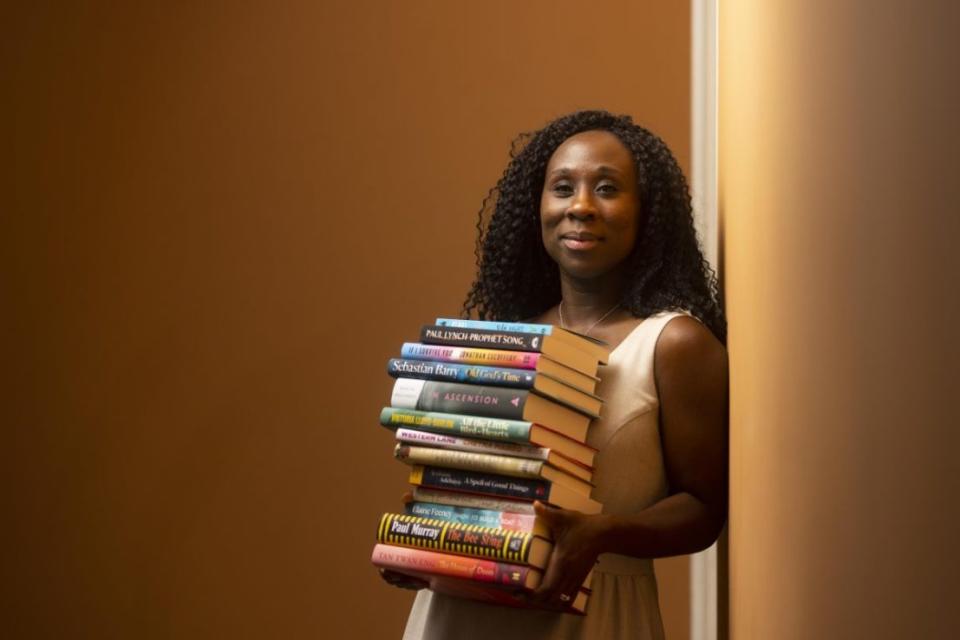‘It wasn’t unanimous’: Booker Prize judge Esi Edugyan on choosing the winner

Paul Lynch’s Prophet Song was last night crowned winner of the 2023 Booker Prize at Old Billingsgate in London. City A.M. spoke to Esi Edugyan, chair of the 2023 Booker Prize judges, ahead of the ceremony to find out what goes on behind the scenes.
“I would be surprised if that was the case,” Esi Edudyan, head judge of this year’s Booker Prize, told me ahead of this year’s award when asked whether she might have to adjudicate in the case of a split vote. “Maybe technically if there’s a break, then I would sort of come in but I’m really thinking it won’t get to that,” she said optimistically.
But last night’s decision to award Irish writer Paul Lynch’s Prophet Song with this year’s prize was not unanimous, Edugyan admitted yesterday. Lynch’s novel, which follows a mother trying to keep her family together in a dystopian Ireland descending into authoritarian rule, had been the bookies’ favourite, though The Bee Sting, written by another Irish Paul (Murray), was also in for a good shout after beating Lynch to Ireland’s national prize last week.
Lynch’s win is timely, coming just in the wake of far-right riots in Dublin, a factor that was raised in the jury’s discussion though Edugyan said it was not the central factor. On the contrary, the decision, made after a six-hour discussion between the Booker’s panel of five judges the day before the prize ceremony, was a product of nine months’ hard graft.
Choosing the Booker Prize shortlist
Edugyan, twice nominated for the Booker herself for Washington Black and Half-Blood Blues, knows a thing or two about prize-worthy writing, but said she was glad to this time be on the other side of the curtain.
“You’re just reading and reading and reading and reading and reading,” Edugyan tells me, and for good reason, with the Booker jury this year tasked with reading 163 books in seven months to draw up their longlist – about a novel a day.
So how do the judges whittle it down? Well, with difficulty. “It’s not something that you could break down on a spreadsheet,” Edugyan tells me. Along with the intensive reading regime, the jury meets monthly for what Edugyan describes as “a book club where everyone is just so brilliant” to discuss the 30-35 books they have just read at considerable pace.
Edugyan said the cases of disagreement – times where you were “so opposed to somebody’s choice or so confused as to why they couldn’t see how wonderful your choice was” – were often some of the most productive, with the process forcing judges to fight for why their choices merited a second look and forcing others to listen.
The panel, this year including Peep Show’s Robert Webb and Bridgerton’s Adjoa Andoh, this year settled on two questions to ask: what is this book doing and what is this book doing to me. “Really, you’re asking yourself, does this book succeed on the grounds that it’s set for itself. That’s really the only measure,” Edugyan says.
Identifying the ‘current moment’
Reading in such a way also gives you a full sense of what it is to be writing in this moment, Edugyan tells me, although she is keen to avoid the use of the word ‘zeitgeist’, which she feels doesn’t truly embody what she means. “You just really get the sense of the era, or the age in which you’re writing. You know, what are the concerns?”
Post-Covid narratives along with eco-anxiety were inevitable trends, though this materialised more in an abstract sense. Many novels “took that feeling and extrapolated it into this kind of core alienation because we’ve all been so isolated or riddled,” Edugyan says. Winning novel Prophet Song, which watches a mother’s world slowly get smaller and smaller, certainly speaks to this.
Edugyan insists there was plenty of whimsy and lightness within the nominations too, but from reading the shortlist one is hard-pressed to tell. The Bee Sting, ostensibly a tragicomedy, certainly runs far more towards the former.
Beyond the Booker
So, now the prize is done, what is next for Edugyan? Well, she is itching to write, for starters.
“I honestly thought I would be able to write during this process,” she says. “I don’t know what I was thinking.” But at least the exercise has left her little short of inspiration, with her describing the regime as a “full education” in writing. Another novel from Edugyan, whose last book Washington Black was itself nominated for the Booker, is sure to stir excitement.
And what about the prospect of reading a non-Booker book? Very exciting, Edugyan admits. The first book she reached for after her seven month submersion in literary fiction: Elon Musk by Walter Isaacson. “A palette cleanser,” she says.

 Yahoo Finance
Yahoo Finance 